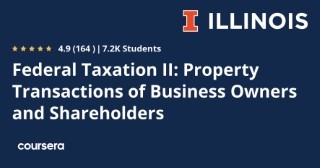Multistate Taxation
Learn about state and local tax laws in the United States with this comprehensive course. Explore income, sales, and property taxes.
This course will examine state and local tax laws prevalent in the United States today. The course will consider the historical progression of state and local taxation, the power of states to tax (and the limitations on that power), and planning strategies for minimizing the impact of state and local taxation. Discussions will focus on income taxes, sales taxes, and property taxes.
If you enjoy this course, consider enrolling in our online graduate Accounting program. The University of Illinois at Urbana-Champaign, consistently ranked as one of the nation’s top three accounting programs, now offers a master’s in accounting at a very affordable tuition rate and is completely online. The iMSA is a full Master of Accountancy program and students graduate with an MS that is highly recognized. Try an open course or two, then apply for admission into the credit-bearing version as you may be eligible to take credit-bearing courses during the application process. If you are missing any prerequisites for the full degree, you can complete Coursera courses to demonstrate readiness and strengthen your application for the iMSA. For more information on this exciting iMSA online program, refer to this link: https://www.coursera.org/degrees/imsa
What you will learn
Module 1: An Introduction to Multistate Taxation
In this module, you will be introduced to your instructor, the course, and to multistate taxation in general. Specifically, you will learn about the most common types of taxes used by state and local governments, the limitations on a state’s ability to tax, and the current revenue challenges facing state and local governments.
Module 2: Federal Limits on Multistate Taxation
In this module, we will discuss the limitations that the U.S. Constitution and Congress can place on a state’s taxing power. Our discussion will primarily focus on the Due Process Clause and the Commerce Clause. We’ll also take a closer look at the Commerce Clause’s substantial nexus requirement.
Module 3: Sales and Use Taxes
In this module, we will discuss sales and use taxes, which are typically excise taxes imposed on retail transactions to the ultimate end-user of a product. We will also discuss some of the various exemptions from the retail sales tax that states offer. And, we will look at the current sales tax landscape after the U.S. Supreme Court’s recent ruling in Wayfair v. South Dakota.
Module 4: Individual Income Taxes
In this module you will be introduced to how states tax income. We will discuss the history and development of state individual income taxes. We will then turn to how state’s utilize the Internal Revenue Code as a head start for their own tax laws. Then we will learn about the two bases of state taxation, residency and source. And, how taxpayers may be eligible for a credit for taxes paid to other states.







There are no reviews yet.